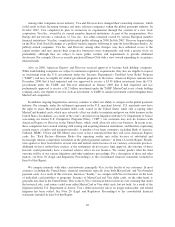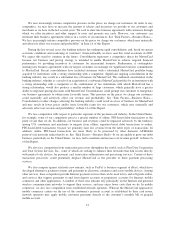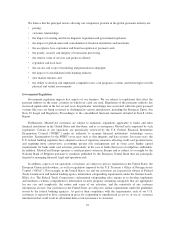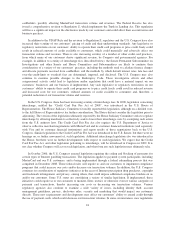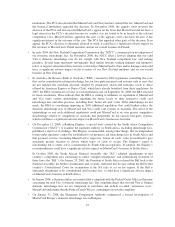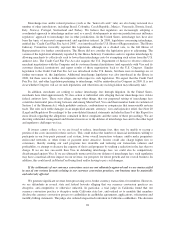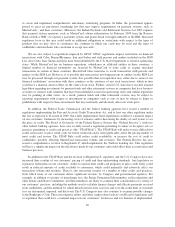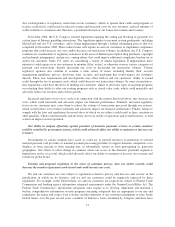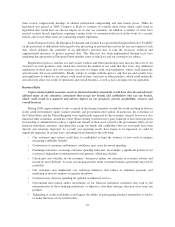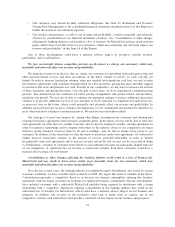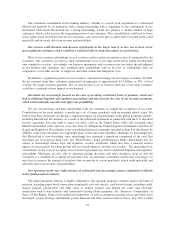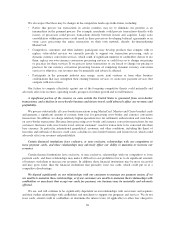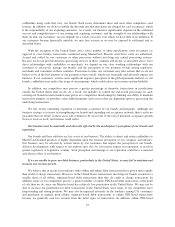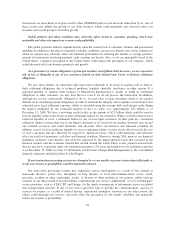MasterCard 2008 Annual Report Download - page 40
Download and view the complete annual report
Please find page 40 of the 2008 MasterCard annual report below. You can navigate through the pages in the report by either clicking on the pages listed below, or by using the keyword search tool below to find specific information within the annual report.to create and implement comprehensive anti-money laundering programs. In India, the government appears
poised to enact an anti-money laundering law that may impose requirements on payment systems, such as
MasterCards’, and their customers. Moreover, the Indian Payments and Settlement Systems Act 2007 requires
that payment system operators, such as MasterCard, obtain authorization by February 2009 from the Reserve
Bank of India (“RBI”) to operate a payments system and grants broad oversight authority to the RBI. Increased
regulatory focus in this area could result in additional obligations or restrictions with respect to the types of
products that we may offer to consumers, the countries in which our cards may be used and the types of
cardholders and merchants who can obtain or accept our cards.
We are also subject to regulations imposed by OFAC. OFAC regulations impose restrictions on financial
transactions with Cuba, Burma/Myanmar, Iran and Sudan and with persons and entities included on the SDN
List. Also Cuba, Iran, Sudan and Syria have been identified by the U.S. State Department as terrorist-sponsoring
states. While MasterCard has no business operations, subsidiaries or affiliated entities in these countries, a
limited number of financial institutions are licensed by MasterCard to issue cards or acquire merchant
transactions in certain of these countries. MasterCard takes measures to avoid transactions with persons and
entities on the SDN List. However, it is possible that transactions involving persons or entities on the SDN List
may be processed through our payment system. It is possible that our reputation may suffer due to some of our
financial institutions’ association with these countries or the existence of any such transactions, which in turn
could have a material adverse effect on the value of our stock. Further, certain U.S. states have recently enacted
legislation regarding investments by pension funds and other retirement systems in companies that have business
activities or contacts with countries that have been identified as terrorist-sponsoring states and similar legislation
may be pending in other states. As a result, pension funds and other retirement systems may be subject to
reporting requirements with respect to investments in companies such as ours or may be subject to limits or
prohibitions with respect to those investments that may materially and adversely affect our stock price.
In addition, the Federal Trade Commission and the federal banking agencies have issued a number of
regulations implementing the Fair and Accurate Credit Transactions Act, and at least one other regulation under
this law is expected to be issued in 2009. Once fully implemented, these regulations could have a material impact
on our customers’ businesses by increasing costs of issuance and/or decreasing the ability of card issuers to set
the price of credit. The Board of Governors of the Federal Reserve System (the “Federal Reserve”), with two
other federal banking agencies, have also recently issued a regulation pertaining to unfair or deceptive acts or
practices pertaining to credit card practices (the “UDAP Rule”). The UDAP Rule will make it more difficult for
credit card issuers to price credit cards for future credit risk and it will significantly affect the pricing models of
most credit card issuers. The UDAP Rule could reduce credit availability, or increase the cost of credit to
cardholders, possibly affecting MasterCard transaction volume and revenues. The Federal Reserve has also
issued a comprehensive revision to Regulation Z, which implements the Truth in Lending Act. This regulation
will have a significant impact on the disclosures made by our customers and could affect their account terms and
business practices.
In addition to the UDAP Rule and the revision to Regulation Z, regulators and the U.S. Congress have also
increased their scrutiny of our customers’ pricing of credit and their underwriting standards. Any legislative or
regulatory restrictions on our customers’ ability to operate their credit card programs or price credit freely could
result in reduced amounts of credit available to consumers, which could materially and adversely affect our
transaction volume and revenues. There is also increasing scrutiny of a number of other credit card practices,
from which many of our customers derive significant revenue, by Congress and governmental agencies. For
example, in addition to scrutiny of interchange fees, the Senate Permanent Subcommittee on Investigations and
other Senate and House Committees and Subcommittees are likely to continue their consideration of a variety of
our customers’ practices, including the methods used to calculate finance charges and allocate payments received
from cardholders, and the methods by which default interest rates, late fees and over-the-credit-limit or overdraft
fees are determined, imposed, and disclosed. The U.S. Congress may also continue to examine possible changes
to the Bankruptcy Code. These investigative efforts and other congressional activity could lead to legislation and/
or regulation that could have a material impact on our customers’ businesses and our business if implemented.
30


